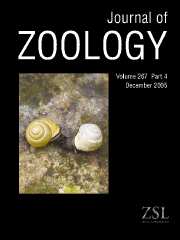Crossref Citations
This article has been cited by the following publications. This list is generated based on data provided by
Crossref.
Weladji, Robert B.
Holand, Øystein
Steinheim, Geir
Colman, Jonathan E.
Gjøstein, Hallvard
and
Kosmo, Ansgar
2005.
Sexual dimorphism and intercorhort variation in reindeer calf antler length is associated with density and weather.
Oecologia,
Vol. 145,
Issue. 4,
p.
549.
Norberg, Harri
Kojola, Ilpo
Aikio, Pekka
and
Nylund, Minna
2006.
Predation by golden eagle Aquila chrysaetos on semi-domesticated reindeer Rangifer tarandus calves in northeastern Finnish Lapland.
Wildlife Biology,
Vol. 12,
Issue. 4,
p.
393.
Moen, Jon
Andersen, Reidar
and
Illius, Andrew
2006.
Large Herbivore Ecology, Ecosystem Dynamics and Conservation.
p.
50.
Loe, Leif Egil
Bonenfant, Christophe
Mysterud, Atle
Severinsen, Torbjørn
Øritsland, Nils Are
Langvatn, Rolf
Stien, Audun
Irvine, R. Justin
and
Stenseth, Nils Chr.
2007.
Activity pattern of arctic reindeer in a predator-free environment: no need to keep a daily rhythm.
Oecologia,
Vol. 152,
Issue. 4,
p.
617.
Fauchald, Per
Rødven, Rolf
Bårdsen, Bård‐Jørgen
Langeland, Knut
Tveraa, Torkild
Yoccoz, Nigel G.
and
Ims, Rolf A.
2007.
Escaping parasitism in the selfish herd: age, size and density‐dependent warble fly infestation in reindeer.
Oikos,
Vol. 116,
Issue. 3,
p.
491.
Mueller, Thomas
Olson, Kirk A.
Fuller, Todd K.
Schaller, George B.
Murray, Martyn G.
and
Leimgruber, Peter
2008.
In search of forage: predicting dynamic habitats of Mongolian gazelles using satellite‐based estimates of vegetation productivity.
Journal of Applied Ecology,
Vol. 45,
Issue. 2,
p.
649.
Vistnes, Ingunn Ims
Nellemann, Christian
Jordhøy, Per
and
Støen, Ole-Gunnar
2008.
Summer distribution of wild reindeer in relation to human activity and insect stress.
Polar Biology,
Vol. 31,
Issue. 11,
p.
1307.
VORS, LIV SOLVEIG
and
BOYCE, MARK STEPHEN
2009.
Global declines of caribou and reindeer.
Global Change Biology,
Vol. 15,
Issue. 11,
p.
2626.
Couturier, Serge
Côté, Steeve D.
Otto, Robert D.
Weladji, Robert B.
and
Huot, Jean
2009.
Variation in Calf Body Mass in Migratory Caribou: The Role of Habitat, Climate, and Movements.
Journal of Mammalogy,
Vol. 90,
Issue. 2,
p.
442.
Rødven, Rolf
Männikkö, Inkeri
Ims, Rolf A.
Yoccoz, Nigel G.
and
Folstad, Ivar
2009.
Parasite intensity and fur coloration in reindeer calves – contrasting artificial and natural selection.
Journal of Animal Ecology,
Vol. 78,
Issue. 3,
p.
600.
HUGHES, J.
ALBON, S. D.
IRVINE, R. J.
and
WOODIN, S.
2009.
Is there a cost of parasites to caribou?.
Parasitology,
Vol. 136,
Issue. 2,
p.
253.
SHARMA, SAPNA
COUTURIER, SERGE
and
CÔTÉ, STEEVE D.
2009.
Impacts of climate change on the seasonal distribution of migratory caribou.
Global Change Biology,
Vol. 15,
Issue. 10,
p.
2549.
Couturier, Serge
Côté, Steeve D.
Huot, Jean
and
Otto, Robert D.
2009.
Body-condition dynamics in a northern ungulate gaining fat in winter.
Canadian Journal of Zoology,
Vol. 87,
Issue. 5,
p.
367.
KUHN, TYLER S.
MCFARLANE, KERI A.
GROVES, PAMELA
MOOERS, ARNE Ø.
and
SHAPIRO, BETH
2010.
Modern and ancient DNA reveal recent partial replacement of caribou in the southwest Yukon.
Molecular Ecology,
Vol. 19,
Issue. 7,
p.
1312.
Kynkäänniemi, Sanna-Mari
Kortet, Raine
Härkönen, Laura
Kaitala, Arja
Paakkonen, Tommi
Mustonen, Anne-Mari
Nieminen, Petteri
Härkönen, Sauli
Ylönen, Hannu
and
Laaksonen, Sauli
2010.
Threat of An Invasive Parasitic Fly, the Deer Ked (Lipoptena cervi), to the Reindeer (Rangifer Tarandus Tarandus): Experimental Infection and Treatment.
Annales Zoologici Fennici,
Vol. 47,
Issue. 1,
p.
28.
2010.
Insects and Wildlife.
p.
285.
King, Sarah R.B.
and
Gurnell, John
2010.
Effects of fly disturbance on the behaviour of a population of reintroduced Przewalski horses (Equus ferus przewalskii) in Mongolia.
Applied Animal Behaviour Science,
Vol. 125,
Issue. 1-2,
p.
22.
Mysterud, Atle
and
Sæther, Bernt-Erik
2011.
Ungulate Management in Europe.
p.
349.
Ashley, N.T.
Barboza, P.S.
Macbeth, B.J.
Janz, D.M.
Cattet, M.R.L.
Booth, R.K.
and
Wasser, S.K.
2011.
Glucocorticosteroid concentrations in feces and hair of captive caribou and reindeer following adrenocorticotropic hormone challenge.
General and Comparative Endocrinology,
Vol. 172,
Issue. 3,
p.
382.
Ballesteros, M.
Bårdsen, B.‐J.
Langeland, K.
Fauchald, P.
Stien, A.
and
Tveraa, T.
2012.
The effect of warble flies on reindeer fitness: a parasite removal experiment.
Journal of Zoology,
Vol. 287,
Issue. 1,
p.
34.


